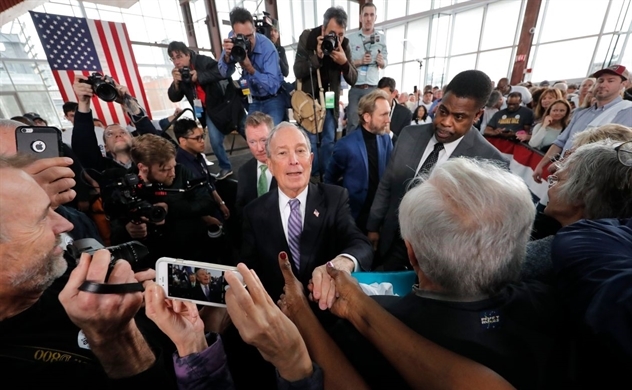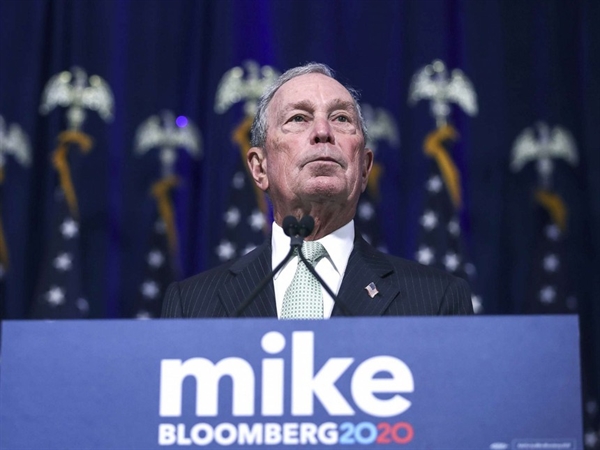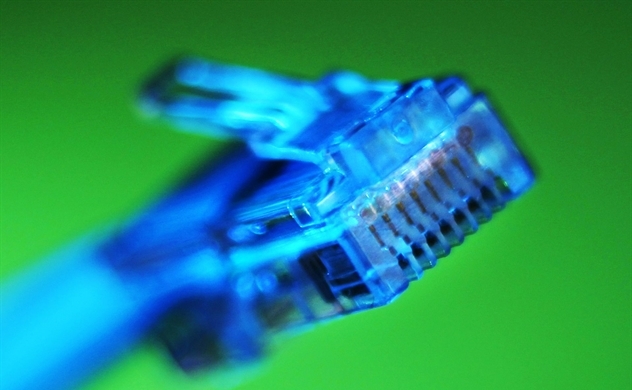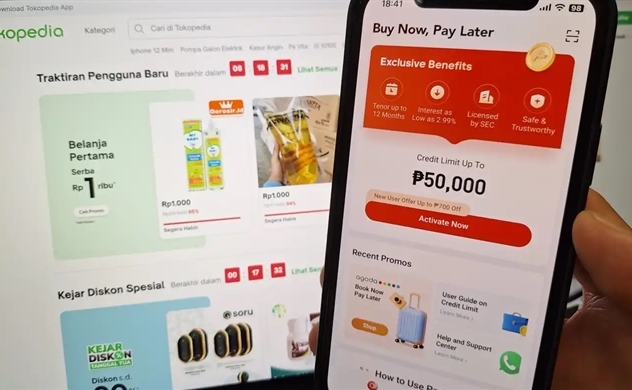Michael Bloomberg may sell Bloomberg LP for $60 billion if elected president

Former New York City Mayor Michael Bloomberg’s company, Bloomberg LP, could sell for as much as $60 billion. PHOTO: GERALD HERBERT/ASSOCIATED PRESS
Michael Bloomberg will sell Bloomberg LP, the multibillion-dollar financial-data and media company he co-founded nearly 40 years ago, if he is elected president, his campaign said Tuesday.
The campaign said Mr. Bloomberg would first put the company in a blind trust and eventually sell. Analysts have estimated the company could sell for as much as $60 billion.
The future of Mr. Bloomberg’s company had been in question since he announced his run for president in November, with him and his advisers going back and forth on whether he would place the business in a blind trust if he won, or if he would divest his interests entirely.
Initially, the campaign and people familiar with the company said Mr. Bloomberg intended to put the company into a trust or similar vehicle, in the event he were to win the election. But on the trail, Mr. Bloomberg later suggested a sale was a possibility.
On Tuesday, after a campaign policy adviser said on CNN that the former New York City mayor intended to sell his company if he won, campaign spokeswoman Galia Slayen acknowledged that the company would ultimately be sold in the event of a victory over President Trump in November.
Mr. Bloomberg, 78, has aggressively campaigned by challenging Mr. Trump’s ethics, noting that the president never placed his business interests in a blind trust, instead turning them over to his sons to run.
Democrats in Congress have accused the president of accepting payments from foreign governments through his hotels and golf resorts, claiming he has violated the emoluments clause of the Constitution, which bars such transactions.
The White House has argued in court that stays at the president’s hotels were not in violation of the law, and an appeals court recently rejected a lawsuit by House Democrats saying they lacked standing to bring the case.
As Mr. Bloomberg has risen in the polls, questions about how he would manage his vast wealth from the Oval Office have gotten louder. Forbes estimates Mr. Bloomberg’s net worth at around $54 billion.
Mr. Bloomberg owns roughly 90% of the closely held data and media company he co-founded in 1981. According to Burton-Taylor International Consulting, a research firm that tracks financial-data companies, Bloomberg LP brought in approximately $10.5 billion in revenue in 2019, up 5.7% over the year before. Bloomberg LP provides news and data to some 325,000 customers, each paying a fixed price of $24,000 a year.
The company’s news division brings in only about 3% of the company’s total revenue, according to the research firm, but has brought outsize attention during the campaign because of how it would cover its owner’s candidacy.
In the past, Bloomberg News has refrained from covering Mr. Bloomberg’s wealth and the company itself. When Mr. Bloomberg announced his intention to run, the news unit said it would continue to not investigate its owner and would do the same for the other Democratic candidates. But it said it would cover the Trump administration as the sitting government.
Burton-Taylor said based on the $27 billion valuation of last summer’s sale of Refinitiv Holdings Ltd., the former data arm of Thomson-Reuters, to London Stock Exchange Group PLC, it estimated that Bloomberg LP could sell for as much as $60 billion.
 |
| Photo: Getty Images |
While the list of possible buyers would be short, Burton-Taylor said it could include stock exchanges, financial consortia and big tech platforms.
Earlier on Tuesday, Mr. Bloomberg qualified for Wednesday’s Democratic presidential primary debate in Las Vegas, where he will appear on stage with the rest of the candidates for the first time.
Mr. Bloomberg hit 19% nationally in a new poll released Tuesday morning—the fourth eligible poll showing him at 10% or above. He placed second, behind Sen. Bernie Sanders of Vermont with 31%.
Democratic National Committee rules for this debate required four national or selected state polls at that level by the end of Tuesday as one way for a candidate to qualify. The poll was conducted by NPR, PBS NewsHour and Marist.
The billionaire hasn’t held a public event since Saturday evening and has been preparing for the debate in recent days, according to people familiar with his planning.
Mr. Bloomberg didn’t qualify for previous debates because he didn’t meet the donor threshold set by the Democratic National Committee, as he is entirely self-funding his campaign. Earlier this month, the DNC eliminated that requirement.
The billionaire has already spent more than $385 million on TV, radio and digital ads alone, according to ad tracking data from CMAG/Kantar.
Ahead of the debate, top candidates attacked Mr. Bloomberg for his heavy spending and his previous comments on a controversial policing practice known as stop-and-frisk.
Mr. Bloomberg will likely continue to be targeted by the other candidates on stage Wednesday. He isn’t competing in Nevada’s caucuses Saturday or in South Carolina’s coming primary, but he will appear on the ballot in 14 states holding nominating contests on March 3.
In recent days, rivals including Mr. Sanders and Massachusetts Sen. Elizabeth Warren have accused Mr. Bloomberg of trying to buy the nomination.
Others, including former Vice President Joe Biden and former South Bend, Ind., Mayor Pete Buttigieg, said that controversial past comments and allegations against Mr. Bloomberg show that he hasn’t been vetted for flaws that could make him vulnerable in the primary, or in the general election.
Mr. Bloomberg has previously apologized for some remarks attributed to him and denied making others. The campaign told the Washington Post this month that Mr. Bloomberg wouldn’t waive nondisclosure agreements reached with some former employees of Bloomberg LP.
Source: WSJ
Same category news
-
Tsubasa Suruga
-
Kenya Akama - Fumika Sato

 TIẾNG VIỆT
TIẾNG VIỆT 










_131447820.png)







